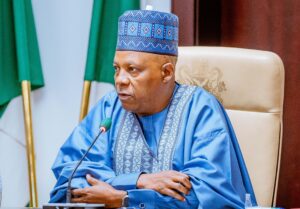Reps, NACCIMA urge CBN to suspend implementation of e-invoicing for import, export
The House of Representatives and the Nigerian Association of Chambers of Commerce, Industry, Mines and Agriculture (NACCIMA) yesterday asked the Central Bank of Nigeria (CBN) to immediately suspend the implementation of the guidelines on the introduction of e-evaluator, e-invoicing for import and exports in Nigeria to allow adequate sensitisation on the workability of the policy in all major ports of entry across the country.
The House resolved to invite the Governor of CBN to give assurance that the target revenue of N3.1 trillion given to the Nigeria Customs Service by the Federal Government will not be distorted by the implementation of the policy.
Adopting a motion by Rep. Leke Abejide, the House also said that a 90-day timeline should always be given in subsequent new fiscal and monetary policy implementation to allow for adjustment in order to stabilise the economy.
In moving his motion, Abejide said the CBN had issued a circular on guidelines on imports and exports, with effective implementation date pegged at February 1, 2022.
He said the effective implementation date is just 10 days from the date the guidelines circular was issued which is not enough period for sensitisation of relevant stakeholders.
Abejide who is also the Chairman of the House Committee on Customs and Excise said this type of monetary and fiscal circular with hurried or haphazard implementation has the capacity to lead to policy summersault.
He said the CBN has deviated from its primary function of monetary policy measures, and bankers to government, and now concentrates more on fiscal policy measure which is supposed to be the function of the Federal Ministry of Finance.
He said: “In any major policy change such as this grace period of 90 days is usual expected for transactions currently initiated to run its full circle in order to avoid distortion in the economy and also to avoid price distortions of trade.
“If the guidelines are not given adequate time with adequate sensitisation in all major borts of entry in the country for stakeholders and the general public to study and get appraised with the nitty gritty of the policy there is no doubt that it will distort prices on daily basis, it will create serious bottlenecks for all imports and exports as the end result will be delay in getting transactions done, and consequently ports congestion.”
He said further that, “In 2020 when the same CBN issued a circular on authentication of FORM NXP for every exporter before any shipping line can load and the implementation was to be immediate, it resulted in crisis as many exporters got their contracts cancelled by their foreign buyers because CBN portal was not properly configured and there was always network issues that sometimes took more than two to three weeks to resolve.
“This led to massive financial loss even after resolving it will come back to same problem again. It was hell for nearly all Nigerian exporters as it took a very long time to stabilize and even as at today the bottlenecks are not finally gone.
“Having gone through the circular, I understand nearly all importers and exporters in manufacturing sector, Mining, trading shall be affected because under exceptions, it was indicated that all exporters and importers with cumulative invoicing value equal to or above $500,000 (or it’s equivalent in other currency) shall be affected and it is glaring it is practically impossible to see anyone below this value cumulatively.
“Another disturbing issue among the guidelines is that contradictions and charges involved. For instance. guidelines (c) and (d) contradicts each other. C says that no importer/exporter May affect payment to the credit of any foreign supplier unless the electronic Invoice has been authenticated by Authorised Dealer Banks presented together with the relevant documents for payment,” Abejide said.
Meanwhile, the Nigerian Association of Chambers of Commerce, Industry, Mines and Agriculture (NACCIMA), yesterday, called on the CBN to extend the take-off date of its e-invoicing and price verification policy which is set to commence on February 1, 2022.
Making the call at a press briefing in Lagos yesterday , the National President of NACCIMA, Ide J. C. Udeagbala, said postponing the date of commencement of the policy was necessary to enable NACCIMA members get acquainted with the new dispensation.
An e-invoice is a digitally-delivered invoice issued, transmitted, received, processed, and stored in a specific standardised format.
Recall that CBN had in a circular titled: ‘Guidelines on the Introduction of e-Evaluator, e-Invoicing for Import and Export in Nigeria’ introduced the e-valuator and einvoice which replaced the hard copy final invoice as part of the documentation required for all import and export transactions.
In the circular dated January 21, 2022, and signed by Director, Trade and Exchange Department, Dr O. S. Nnaji, the apex bank noted that the new regulation was aimed at achieving accurate value from import and export items in and out of the country.
“Effective February 1, 2022, all import and export operations will require the submission of an Electronic Invoice (e-Invoice) authenticated by the Authorised Dealer Banks on the Nigeria Single Window portal – Trade Monitoring System (TRMS),” the statement addressed to all authorised dealers and the general public, read.
However, NACCIMA described the policy’s February 1, 2022 commencement date as “too soon,” and called on the CBN to postpone it, arguing that “transition challenges will lead to chaos with immediate implementation. “We also request the CBN to make the operation of these policies cost-friendly,” it added.
While emphasising that NACCIMA does not have any problem with the policy, Udeagbala said: “Our take is that we should be given enough time. February 1st is too soon. And the question is what about some goods that have not been consummated, so that they will give room in order for foreign exchange obligations to those products to be met?”
He reiterated that the Chamber was not saying that “we are not part of it, NO, we are saying we need some time extension in order for us to get used to that.”




